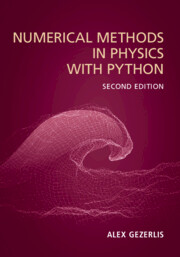4 - Matrices
Published online by Cambridge University Press: 30 August 2023
Summary
Chapter 4 starts out with a physics motivation, as well as a mathematical statement of the problems that will be tackled in later sections. An extensive section discusses the conditioning of linear-algebra problems: borrowing ideas and examples from matrix perturbation theory, this teaches students what to look out for. Roughly half of the remaining chapter is dedicated to the solution of linear systems of equations, employing methods of varying sophistication: Gaussian elimination, LU decomposiion, pivoting, and the Jacobi iterative method. The second half addresses the eigenvalue problem, again with a variety of methods, including the power method, eigenvalue shifting, and the QR method. Crucially, this includes explicit mathematical derivations of these approaches. A brief introduction to the singular value decomposition is also given, including both an existence proof and a programming implementation. The chapter is rounded out by an extensive physics project, which studies the eigenvalue problem of interacting spins, and a problem set. The physics project patiently builds up matrix quantum mechanics, allowing students to tackle problems of increasing difficulty.
Keywords
Information
- Type
- Chapter
- Information
- Numerical Methods in Physics with Python , pp. 126 - 231Publisher: Cambridge University PressPrint publication year: 2023
